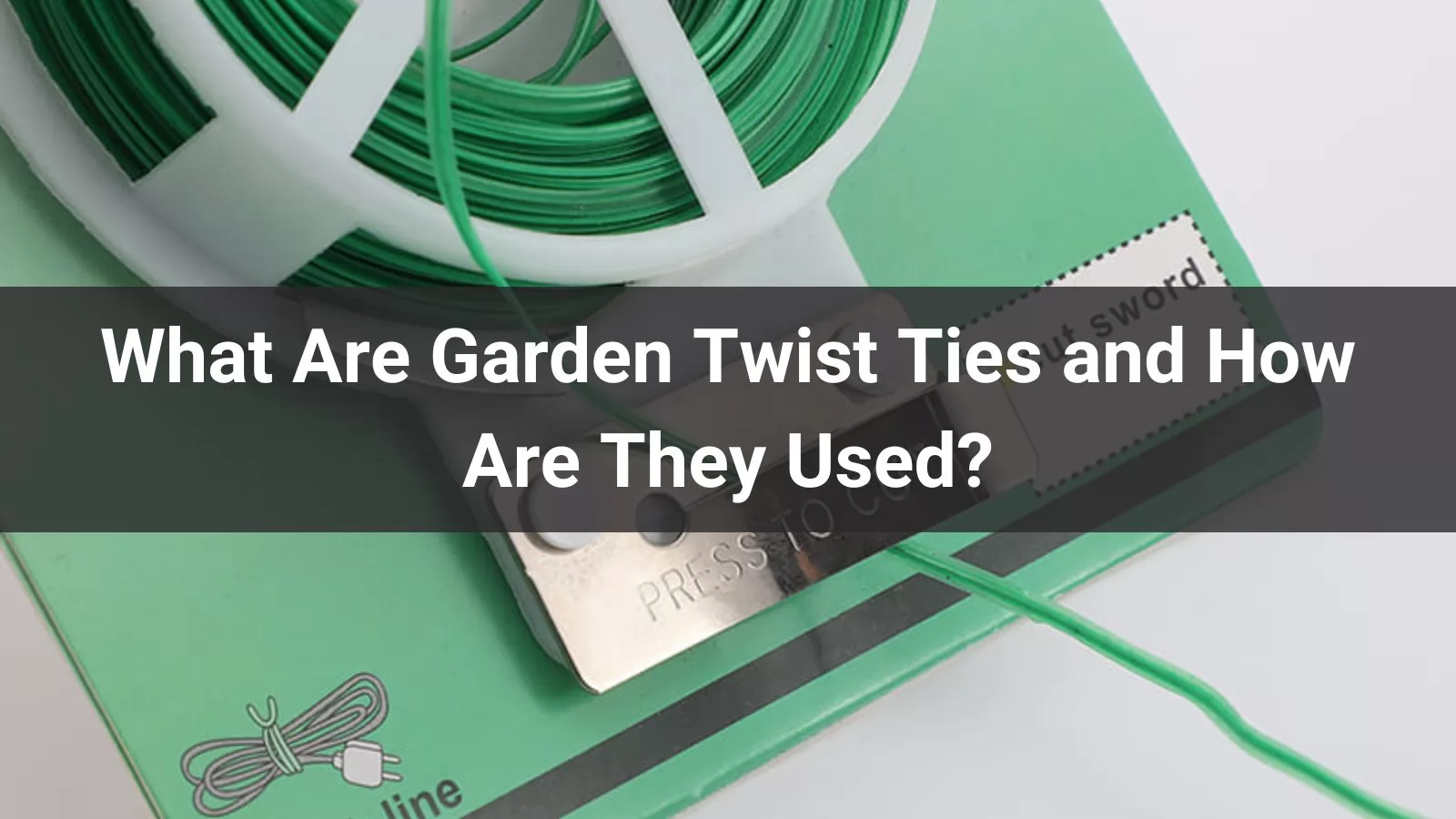
Garden twist ties are versatile, flexible tools used primarily in gardening to support and organize plants, secure vines, and manage garden structures. Comprising a wire core coated with materials like plastic, rubber, or jute, these ties offer a balance of strength and gentleness, making them ideal for delicate plant stems and robust outdoor applications. Their ease of use, reusability, and adaptability have made them indispensable for gardeners, from hobbyists to professionals. This article explores the definition, types, benefits, and diverse applications of garden twist ties, emphasizing their role in fostering healthy plant growth and organized gardens.
A garden twist tie is a flexible fastening tool consisting of a thin metal wire encased in a protective coating, typically plastic, soft rubber, or natural materials like jute. The wire provides structural strength, while the coating prevents damage to plant tissues and enhances durability in outdoor conditions. Unlike traditional twine or rope, twist ties require no knot-tying; they are secured by wrapping around an object and twisting the ends together, offering a quick and adjustable solution for plant support and organization.
Available in various lengths (from a few inches to over 100 feet), diameters (e.g., 2.5mm to 5mm), and colors (often green to blend with foliage), garden twist ties are designed to meet diverse gardening needs. Many include built-in cutters for easy trimming, and some are biodegradable or reusable, aligning with sustainable gardening practices.
Garden twist ties come in several forms, each tailored to specific applications:
Plastic-Coated Twist Ties: These feature a metal wire core covered in durable, weather-resistant plastic, often green to blend with plants. They are ideal for outdoor use, resisting moisture and UV exposure, and are commonly used for securing plants to stakes or trellises.
Rubber-Coated Twist Ties: With a soft, flexible rubber coating, these ties are gentler on delicate stems, preventing abrasions or constriction. They are perfect for supporting young plants, tomatoes, or bonsai.
Jute-Covered Twist Ties: These use natural jute as a coating, offering an eco-friendly, biodegradable option. They provide a rustic aesthetic and are suitable for temporary support of plants like roses or ferns.
Reusable Twist Ties: Made from durable materials like TPR (thermoplastic rubber) or PE-coated wire, these ties can be untwisted and reused, reducing waste. Some include stretchable properties to accommodate plant growth.
Twist Ties with Built-In Cutters: Available in long rolls (e.g., 20m to 100m), these ties come with a dispenser and cutter for convenient, custom-length cuts. They are versatile for both gardening and home organization.
Garden twist ties offer numerous advantages that make them a preferred choice for plant care and garden management:
Ease of Use: No knot-tying is required; simply wrap and twist to secure. This saves time and effort, especially for large gardens.
Gentle on Plants: Soft coatings like rubber or jute prevent damage to stems, ensuring healthy growth without constriction.
Durability: Plastic or rubber-coated ties withstand harsh weather, including rain, sun, and wind, ensuring long-term reliability.
Versatility: Suitable for a wide range of plants (vines, shrubs, flowers) and non-gardening tasks like cable organization or securing garden furniture covers.
Reusability and Sustainability: Reusable and biodegradable options reduce environmental impact, appealing to eco-conscious gardeners.
Aesthetic Integration: Green or natural-colored ties blend seamlessly with foliage, maintaining a tidy and visually appealing garden.
Garden twist ties have a broad range of applications in gardening and beyond, offering practical solutions for plant support, organization, and creative projects. Below are some key uses:
Twist ties are widely used to secure plants to stakes, trellises, or cages, promoting healthy growth and preventing damage from wind or heavy fruit. For example, tomato plants can be tied to bamboo stakes to support developing fruit trusses, while climbing plants like clematis or roses are trained along fences or pergolas for aesthetic growth patterns. Biodegradable ties are ideal for plants that develop their own support over time, while sturdy ties suit permanent fixtures. Gardeners should leave slight slack in the tie to allow for stem expansion.
Twist ties help stabilize garden structures, such as netting, row covers, or furniture covers. They can secure protective covers over outdoor dining tables or chairs, preventing wind from dislodging them. Releasable twist ties are particularly useful for temporary setups, allowing easy removal and repositioning.
Twist ties keep gardening tools like trowels, secateurs, or BBQ utensils organized by hanging them on hooks or nails in sheds. Their strength (some with tensile strength up to 8.1kg) ensures they can support heavier items. They also double as cable ties for organizing headphones, USB cables, or charger cords, reducing clutter in homes or offices.
Twist ties enable creative gardening projects, such as hanging colorful pots for herbs or flowers. Gardeners can drill holes in recycled pots, loop twist ties through, and hang them on fences or trellises. They are also used in crafts, like securing wire mesh for sculptures or labeling plants with broad paper-covered ties.
In a pinch, twist ties can serve as temporary fixes, such as replacing broken strimmer wire or securing bags of yard waste. Their flexibility and strength make them a handy tool for quick solutions in the garden.
Water-resistant twist ties are sometimes used to bundle vegetables like lettuce or herbs for sale, though hook-and-loop closures are increasingly replacing them. Metallic or colored ties can add decorative flair to packaging.
While garden twist ties are highly effective, certain challenges should be noted:
Durability Over Time: Standard twist ties may become brittle or fade after prolonged sun exposure. Opting for UV-resistant or rubber-coated ties can mitigate this.
Plant Damage: Incorrectly applied ties (too tight or without slack) can constrict growing stems. Soft-coated or stretchable ties reduce this risk.
Cutter Quality: Some built-in cutters on roll dispensers are less effective, requiring scissors for precise cuts.
Environmental Impact: Non-biodegradable ties contribute to waste if not reused. Biodegradable or jute options are preferable for eco-friendly gardening.
Garden twist ties are a gardener’s ally, combining simplicity, strength, and versatility to support plants, organize spaces, and inspire creativity. Whether securing tomato vines to stakes, training climbers along trellises, or organizing tools and cables, these ties offer practical and sustainable solutions. Their variety—plastic, rubber, jute, or reusable—ensures there’s a twist tie for every need, from temporary plant support to long-term garden projects. By selecting the right type and applying them thoughtfully, gardeners can enhance plant health, maintain tidy gardens, and streamline tasks, making twist ties an essential tool in modern horticulture. If you are looking for a reliable Chinese supplier, Contact us at Linkwin now!











We use cookies to make the website work, to provide advanced features, social media and traffic analysis, and we use analytics and third-party advertising cookies. If you choose to click "Deny All", you will retain the default setting of not allowing the use of cookies or other tracking tools other than technical tools.



